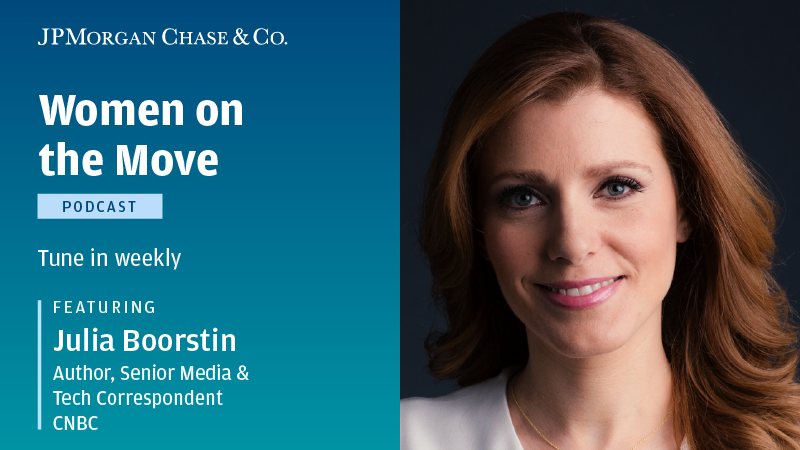Empathy, vulnerability, authenticity, and more: Why women are innately effective leaders, with CNBC reporter and author of When Women Lead, Julia Boorstin
Skills and strategies of effective leadership, with the author of When Women Lead
In this episode, host Sam Saperstein kicks off Women’s History Month by sitting down with Julia Boorstin, CNBC's senior media and technology reporter, and the author of When Women Lead. She interviewed over 100 women from various sectors and backgrounds for her book, which “brings together the stories of women CEOs and leaders, as well as new studies.” Sam and Julia talk about the lessons she learned and the key commonalities her research uncovered in terms of the skills and strategies of successful leaders.
Digging into women’s leadership styles
Julia tells Sam that she was inspired to write her book after her 20-plus years as a business journalist. Her career spanned six years as a writer at Fortune Magazine and then 16 years as a business reporter with CNBC. Along the way she created and launched the CNBC “Disruptor 50,” an annual list highlighting private companies that are transforming the economy. “And in that time, I've been really grateful to get to interview thousands and thousands of leaders, CEOs, founders, [and] executives,” she says. “And the vast majority of those people have been men. The vast majority of them have been white men.”
In the past decade, she says she’s noticed more and more women entering the conversation, and an increase of female founders in particular. “And it was interesting for me through my work doing the “Disruptor 50” list to see women founders create companies that were tackling different types of problems than the male founders were,” she says. “And also to approach that problem solving and approach their businesses, managing their businesses, leading their businesses differently.”
What makes women leaders shine?
Julia notes that while each of the 120 individuals she interviewed for her book are unique, she did find common threads in the attributes of successful business people, like having a growth mindset. She defines it as having a combination of the humility to understand you don't know everything and the confidence to believe that you could grow and push yourself to do the things that you aren't currently capable of. A second commonality, she says, is having authenticity. “The women who had succeeded did so by not trying to fit into any sort of stereotype or archetype of what leaders are supposed to look or sound like, but by leading in ways that were really honest and true to themselves,” she says.
Julia also discusses a list of more specific skills and strategies that she says research has shown to be effective. “Almost everything I write about are things that are socialized, and therefore they are things that if men want to get better at, they can learn as well,” she notes.
Her list starts with empathy. “Empathy is really about the ability to see things from someone else's perspective, which can be incredibly strategic if you're negotiating a deal or if you're trying to motivate your employees or to figure out what's gonna be more successful working with a team,” she says.
Other items on her list include vulnerability, a “communal leadership style,” and a divergent approach to problem solving rather than a convergent approach. Men, she says, are more likely to have a convergent approach where they focus in on solving the problem as quickly and efficiently as possible. On the other hand, she says, women are more likely to have divergent approach, where they're more likely to ask about things that may appear to be tangential but really are about taking the time to understand the broader landscape.
Julia also responds to audience questions that dig deeper into her findings on the nuanced differences between men’s and women’s leadership styles, on ideas such as intersectionality, and on traits including extroversion and introversion. Overall, she says, what she learned in the course of writing the book made her optimistic. “I'm very optimistic about the power that women have to drive change not just in the industry but to help each other succeed,” she says.




